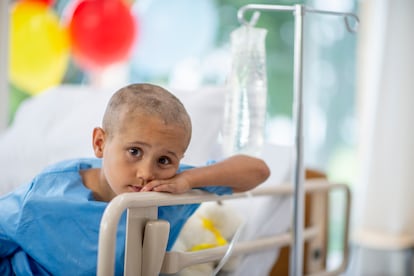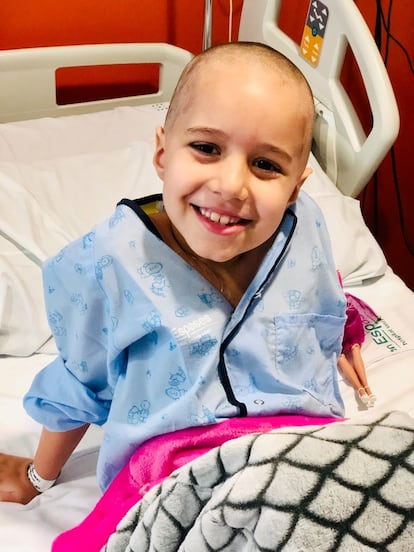Children with cancer: Why we must tell them the truth and break the taboo around the disease
Misinformation does not prevent children from sensing their disease. It is advisable to explain things to them based on their level of understanding and language. That way, they can ask questions about their cancer treatment and even be consulted in making decisions

Around 400,000 children worldwide between the ages of 0 and 19 are diagnosed with a malignant tumor each year, according to the World Health Organization (WHO). The most common diseases are leukemia, brain tumors, lymphomas and solid tumors such as neuroblastoma and Wilms tumors. The origin of childhood cancer is unknown. It is considered a rare disease because its incidence is 150 cases per million inhabitants under 15 years of age, and because the survival rate in children is 80%, although this figure has stagnated for years due to lack of research.
In 2020, during the Covid-19 lockdown, little Celia complained of severe pain in her hip. The final diagnosis was Ewing’s sarcoma, a tumor that forms from a certain kind of cell in bone or soft tissue and presents with pain. She had a tumor of about four centimeters in her pelvis and received a poor prognosis. There was no metastasis, but also no way to remove it. On July 28, 2021, after unsuccessful chemotherapy treatment, Celia died at just seven years of age. In her book SuperCelia: Adventures on Saturn, done in partnership with the NGO Cris Cancer Foundation, Patricia Jiménez Ranchal’s reflects on her daughter’s creativity through her stories and drawings. Her goal is to raise funds for cancer research.
Patricia Jiménez Ranchal’s family chose to understand cancer as a challenge or a long-distance race and to set goals on a daily basis. She believes that children must be given permission to cope with cancer as best they can: “It is important to know your children in order to know what they need at any given moment, in addition to the support of experts. I used to tell my daughter: ‘If you are angry, show your anger or if you are sad, cry, kick and scream.’” For her, the worst thing is sitting down with the child and trying to tell her what is happening to her, trying not to frighten her.
She also says that she wanted her daughter to be aware of what was happening to her at all times, giving her a free hand to ask what was on her mind: “We shouldn’t tell them something that is going to make them more anxious, but we shouldn’t lie to them either.” For example, Celia’s mother used Playmobil clicks to create fantastic or real stories with her daughter. On days when they had a medical test, they made an effort to make it fun: “If Celia had to have an MRI, she wore a costume. We imagined we were going to a spaceship, not just a machine, and we drew pictures for the [healthcare] professionals.” She tells us that parents are there to heal on an emotional level: “Children are very strong and adapt to everything. In my case, I tried to make sure she didn’t lose contact with the people who loved her, whether it was through messages or video calls.”

Are children with cancer warriors?
Cancer is often compared to a battle that has to be won, but some professionals say that this is not always the best way to approach it. As Jaime Verdú Amorós, a physician at the Pediatric Oncology and Hematology Unit of the University of Valencia Hospital Clinic in Spain, points out, misinformation does not prevent minors from sensing their disease, and it can also cause them to mistrust the healthcare team or their parents. Verdú explains that the medical team initiates the process with the family and the patient in the following way:
- Generally, the minor’s parents or legal guardians are informed about the diagnosis and prognosis of the disease first and a treatment plan is proposed. Initially, the medical team tries to get the parents to explain information about the disease to the child or adolescent after providing them with the tools to do so.
- The process of informing patients is more complex. Age is a determining factor, since the ability to understand, values, concerns and life expectations vary widely from childhood to adolescence. Subsequently, they take the opportunity to offer the patient information and resolve doubts and concerns in the presence of their parents.
- Other sociocultural and/or religious factors, which were probably unknown to the healthcare team up to that point, inform how bad news is handled.
- “Sometimes, parents request that the professional tell the child directly to avoid the experience of giving the bad news to the child [themselves]. Other times, parents ask to hide [the diagnosis] or delay [when the child is told],” Verdú Amorós says, emphasizing his deep admiration for patients and their caregivers.
Do not make children responsible for their own recovery
Buenaventura del Charco, a public health psychologist and university lecturer, notes that the message that children facing cancer are heroes or warriors has become very popular: “These [descriptions] are very much informed by slogans like that of Pablo Ráez, a Spanish youth athlete and blogger, who became famous when he faced his leukemia with his catchphrase ‘always strong.’ Another example is the Catalan show Pulseras Rojas [Red Bracelets, which tells the daily story of a group of children and teenagers who are in the same pediatric ward at a hospital because of their illnesses].”
Del Charco also observes that we must not forget that these cancer patients are both sick and children: “If we didn’t take that into account, we would be denying reality and adding responsibility and stereotypes that a minor can seldom oppose, which can prevent them from freely expressing their needs and emotional experiences.” Del Charco wants to remind families that children must be fully aware of what they are experiencing: “It is important to explain things to them at their level of understanding and language and to let them ask questions about their cancer and even, to the extent possible, be consulted when making decisions about their disease.”
“In a fight or battle, the strongest person usually wins, and with this terrible disease, overcoming it does not depend on the person’s desire, effort and individual characteristics, but on the disease,” says psychologist and content creator Elizabeth Clapés. According to the expert, while it is nice to call a child who has beat cancer a champion, that can imply the opposite about the people who have succumbed to cancer: “And they are not losers at all.” Clapés recommends telling children the truth (as long as the doctors do not advise otherwise); she also says to avoid making the disease a taboo subject. The psychologist stresses that “out of sight, out of mind” does not work for children and that hiding information from them will lead them to question many things. “They may or may not believe that reality is accurate, and imagining it as [even] worse is terrible.”
You can follow Mamas & Papas on Facebook, X or sign up here to receive our biweekly newsletter.
Tu suscripción se está usando en otro dispositivo
¿Quieres añadir otro usuario a tu suscripción?
Si continúas leyendo en este dispositivo, no se podrá leer en el otro.
FlechaTu suscripción se está usando en otro dispositivo y solo puedes acceder a EL PAÍS desde un dispositivo a la vez.
Si quieres compartir tu cuenta, cambia tu suscripción a la modalidad Premium, así podrás añadir otro usuario. Cada uno accederá con su propia cuenta de email, lo que os permitirá personalizar vuestra experiencia en EL PAÍS.
¿Tienes una suscripción de empresa? Accede aquí para contratar más cuentas.
En el caso de no saber quién está usando tu cuenta, te recomendamos cambiar tu contraseña aquí.
Si decides continuar compartiendo tu cuenta, este mensaje se mostrará en tu dispositivo y en el de la otra persona que está usando tu cuenta de forma indefinida, afectando a tu experiencia de lectura. Puedes consultar aquí los términos y condiciones de la suscripción digital.









































